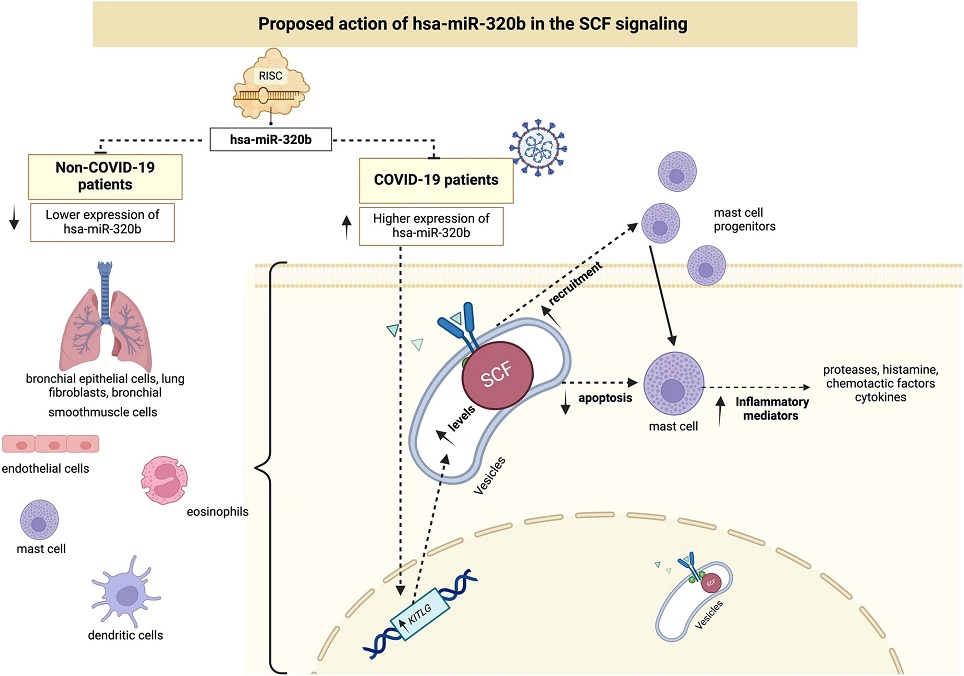Nikhil Prasad Fact checked by:Thailand Medical News Team Jun 19, 2024 10 months, 2 weeks, 6 days, 2 hours, 22 minutes ago
COVID-19-News: COVID-19, caused by the virus SARS-CoV-2, has dramatically changed our lives since its appearance. The disease spreads primarily through respiratory droplets, with common symptoms like fever, fatigue, and cough. While most people experience mild symptoms, some cases can escalate to severe illness, leading to complications such as pneumonia, organ failure, and even death. Factors like age and pre-existing health conditions, including diabetes and heart disease, increase the risk of severe COVID-19.
 Role of miR-320b in COVID-19 Diagnosis and Severity Prediction
Proposed action of has-miR-320b in the SCF pathway. Increased hsa-miR-320b expression in patients with COVID-19 leads to an increase in KITLG gene expression and SCF protein. As a result, there is an increase in the recruitment of mast pro-genitor cells, contributing to an increase in the release of inflammatory mediators, a characteristic feature of SARS-CoV-2 infection.
What are MicroRNAs?
Role of miR-320b in COVID-19 Diagnosis and Severity Prediction
Proposed action of has-miR-320b in the SCF pathway. Increased hsa-miR-320b expression in patients with COVID-19 leads to an increase in KITLG gene expression and SCF protein. As a result, there is an increase in the recruitment of mast pro-genitor cells, contributing to an increase in the release of inflammatory mediators, a characteristic feature of SARS-CoV-2 infection.
What are MicroRNAs?
MicroRNAs (miRNAs) are tiny molecules that play a big role in our cells. They are part of the epigenetic system, which regulates how our genes are expressed without changing the DNA sequence itself. In the context of viral infections like COVID-19, miRNAs can either help fight the virus or assist in its replication.
The Study on miR-320b
A team of researchers from Brazil conducted a study that is covered in this
COVID-19 News report to explore the role of specific miRNAs in COVID-19. They focused on miR-320b, a microRNA found in blood plasma. The study aimed to see if miR-320b levels could differentiate between COVID-19 patients and healthy individuals.
The researchers recruited 90 COVID-19 patients and 40 healthy volunteers. They used a technique called quantitative real-time polymerase chain reaction (qRT-PCR) to measure the levels of miR-320b in the participants' blood plasma.
Key Findings
-Higher miR-320b Levels in COVID-19 Patients: The study found that miR-320b levels were significantly higher in COVID-19 patients compared to healthy individuals. This suggests that miR-320b could potentially serve as a biomarker for identifying COVID-19.
-Severity of COVID-19 and miR-320b: Interestingly, the levels of miR-320b varied with the severity of the disease. Patients with mild to moderate COVID-19 had higher levels of miR-320b than those with severe or critical illness. Furthermore, among severely ill patients, lower levels of miR-320b were associated with a higher risk of death.
-Predictive Value: The study used statistical analyses to determine the effectiveness of miR-320b as a diagnostic tool. They found that miR-320b had good specificity, meaning it was reliable in identifying individuals who were not infected with SARS-CoV-2. However, its sensitivity was modest, indicat
ing that while it could identify many COVID-19 cases, it also missed some.
In Silico Analysis
The researchers also performed in silico (computer-based) analysis to understand how miR-320b might influence COVID-19. They discovered that miR-320b interacts with several genes involved in inflammatory processes, which are crucial in the body's response to infection.
Implications and Future Research
This study highlights the potential of miR-320b as a biomarker for COVID-19. By identifying and measuring miR-320b levels, healthcare providers might better diagnose COVID-19 and predict its severity. However, more research is needed to confirm these findings and to explore whether miR-320b can be used in clinical practice.
The study's limitations include differences in ethnicity and comorbidities between the control and case groups, which could influence the results. Additionally, the proposed mechanisms were based on in silico analyses and need to be validated through laboratory experiments.
Conclusion
The discovery of miR-320b's role in COVID-19 provides a promising avenue for improving our understanding and management of the disease. By continuing to explore the functions of miRNAs like miR-320b, we move closer to better diagnostic tools and treatments for COVID-19 and other viral infections.
The study findings were published in the peer reviewed journal: Scientific Reports.
https://www.nature.com/articles/s41598-024-64325-9
For the latest
COVID-19 News, keep on logging to Thailand Medical News.
Read Also:
https://www.thailandmedical.news/news/study-finds-that-sars-cov-2-orf3a-modulates-pi3k-akt-signaling-in-lung-epithelial-cells-via-hsa-mir-155-5p
https://www.thailandmedical.news/news/covid-19-genetics-genomics-role-of-mirnas-and-rna-interference-rnai-in-sars-cov-2-infection-and-pathogenesis
